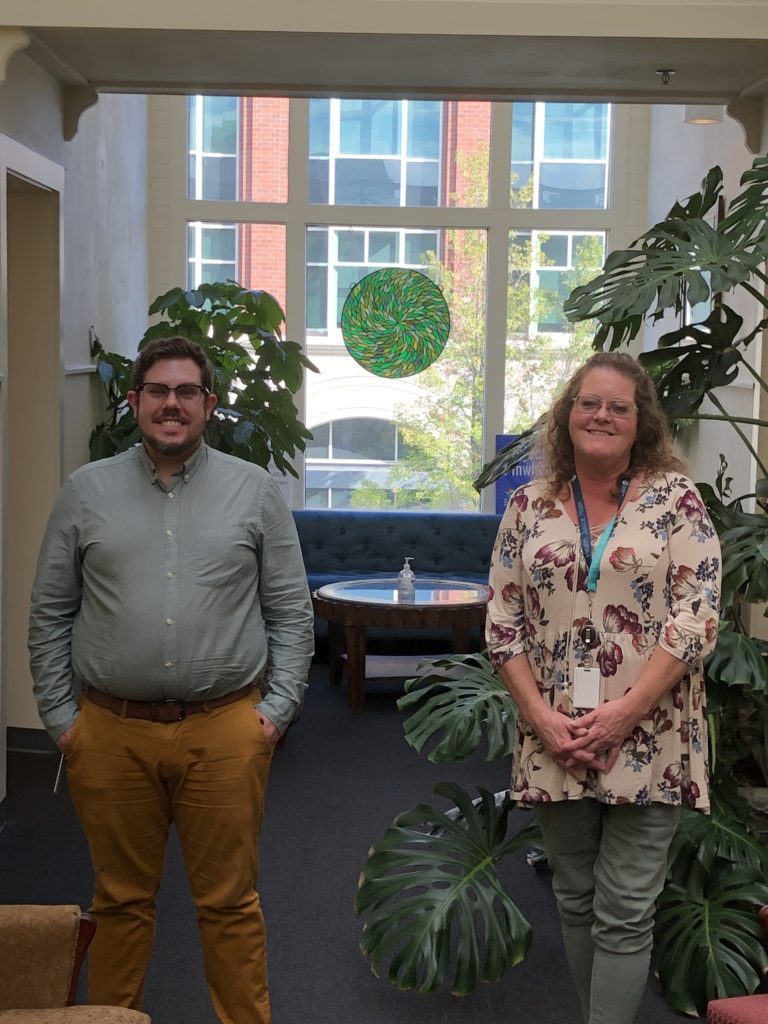Staff Feature: Kristina Hammond and Blaine Huizinga
Meet: Kristina Hammond and Blaine Huizinga
Job: Crime Victim Advocates
District: Spokane
 Driven by a passion to help some of society’s most invisible crime victims, Kristina and Blaine want to share what they know with anyone who will listen.
Driven by a passion to help some of society’s most invisible crime victims, Kristina and Blaine want to share what they know with anyone who will listen.
Both are certified sexual assault victim advocates. But they’ve also developed a niche as champions of resilience, self-empowerment and non-traditional justice for people who often fall through the cracks: those who are later-in-life or vulnerable due to cognitive impairment.
Kristina, with decades of domestic violence victim advocacy under her belt, founded a regional Elder Justice Task Force in 2018, around the time she helped LCS Northwest launch its Spokane program focused on later-in-life victims. Blaine joined her after coming to the agency in 2019. He’s worked closely with law enforcement, court commissioners and prosecutors, community centers, retirement homes or other housing for vulnerable individuals.
Now the two have taken their knowledge to a national audience. On Oct 6, they gave a presentation to the National Center for Victims of Crime. The title of their session: “Justice by Any Other Name: An Innovative Approach to Victim-Centered Justice for People with Intellectual Disabilities and Older Adults.”
The need for such trainings is underscored by a hard reality: Research shows that one in ten older adults are mistreated each year, ranging from physical, sexual or psychological abuse, neglect or abandonment, or financial exploitation, often at the hands of family members. And fewer than 5 percent of cases come to light.
The darkness is starting to lift, thanks to the work of Kristina, Blaine and others. Today older adults and other non-intimate DV victims comprise 70 percent of their caseload, a big swing from 20 percent just three years ago.
“Prosecutors were dropping the DV charges on all non-intimate partner violence,” Kristina recalled. “People were walking away without being protected or knowing they could be protected.”
Today, health, justice and hope are happening, though not always according to the traditional law-and-order script that can retraumatize survivors. One example of the new model: A man with Down Syndrome was sexually abused a few years ago by another client at an adult day program in Spokane. Rather than press charges, LCSNW staff arranged for him to meet with a robed judge and a uniformed police sergeant inside a courtroom. The judge made clear it was not a legal proceeding, but the victim fulfilled his wish to tell his story.
“I see such potential, whether it’s called restorative or survivor-centered justice,” Blaine said, adding that “our space isn’t a court case with a beginning or ending. We provide ongoing support and encouragement long after a trauma occurred.”
Education: Kristina studied at Tacoma Community College. She started with the intent of working as a drug and alcohol counselor before shifting to victim-oriented justice. Blaine studied vocal performance at the University of Montana before becoming a certified Washington state crime victim advocate and program supervisor.
Fun Facts about Kristina and Blaine: She participates in mountain man rendezvous events, where she enjoys firing black powder muzzle loaders. He enjoys sharing his baritone-tenor voice with the community in local chorales – when there’s no pandemic going on.

0 Comments